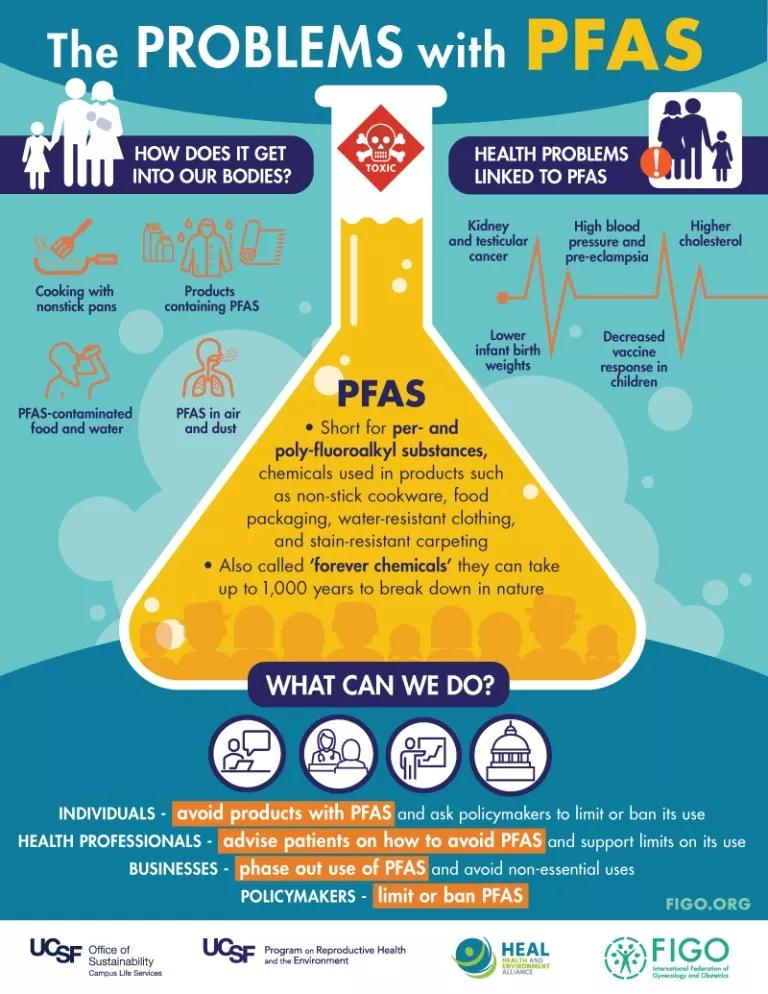Phase Out PFAS from Global Use
Women's health federation issues a global call for phase out of PFAS 'forever' chemicals, to address the mounting contamination and likely health problems they cause.

Science-based Policy Advice from Women’s Health Providers
The International Federation of Gynecology and Obstetrics (FIGO), a worldwide federation of women’s health organizations, has called for the global phase-out of PFAS—a class of “forever chemicals” widely used in products as diverse as food packaging, rain-resistant clothing, firefighting foams, cosmetics, and non-stick pans. The urgent call from FIGO comes decades after PFAS were allowed into widespread commercial use without sufficient testing to assure safety.
Growing documentation on the problems with PFAS
PFAS can take hundreds to thousands of years to break down in the environment. The extreme persistence and often high mobility of PFAS has ensured their widespread contamination of the global environment, often including drinking water. As a result, PFAS are now detectable in nearly everyone’s body, including at concerningly high levels in breast milk. FIGO and its partners, in close consultation with NRDC experts David Wallinga and Anna Reade, created a fact sheet to describe the significant threat that PFAS pose to human health, especially the health of all women, pregnant women, and children.
To further drive transparency around the issue and begin piecing together PFAS data, NRDC’s Dr. Reade and her colleagues recently launched a comprehensive, interactive database of all published health and toxicology studies on 29 PFAS up to May 2019. This groundbreaking resource underscores the scientifically verified breadth of data on potential harms related to PFAS exposure, including cancer, kidney and liver damage, impaired immunity and fertility, and adverse pregnancy outcomes. While already robust, the evidence of harm due to PFAS exposure will only keep growing so long as they are being marketed and used.
Integrated solutions to address PFAS contamination
Clearly, current policies to manage chemicals are failing to control widespread human exposures to this large class of hazardous compounds. New, comprehensive solutions are needed to protect human health and the environment. NRDC supports FIGO’s policy recommendations, especially those that urge companies using and marketing PFAS to make significant changes in their practices, and for policy makers to hold these companies accountable. Those recommendations include:
- Prioritize legislation to phase out all non-essential uses and manufacturing of PFAS, starting with uses that are likely to result in greater exposures to pregnant women and children;
- Require transparency on PFAS use;
- Invest in safer alternatives for essential uses and in improved monitoring, clean-up and disposal technologies;
- Mitigate ongoing exposure to PFAS by cleaning up polluted environmental resources and securing storage of highly contaminated PFAS waste until a safe destruction method has been determined;
- Require regulatory assessment of PFAS, including toxicological and exposure assessment, as a class.
Much of NRDC’s work on PFAS aligns with FIGO's recommendations. For example, NRDC helped pass state legislation requiring the phase-out of PFAS-containing firefighting foam, and it is currently co-sponsoring a California bill that also would ban use of PFAS in food packaging, as well as require disclosure of PFAS and other chemicals of concern in cookware. We have also advocated for class-based management of PFAS in drinking water, and in general. And because PFAS is a global issue, NRDC collaborated with the United Nations and the Strategic Approach to International Chemicals Management on a newly released report that focuses on changes that the textile industry, a large source of PFAS contamination, as well as policy makers must tackle to address this public health crisis.
Working daily with patients who miscarry, are infertile, or are experiencing other medical conditions to which PFAS exposure may contribute, FIGO’s medical experts recognize that preventing these exposures in the first place must be a part of the solution. And because of the extremely high persistence of PFAS, that necessarily means ending their existing uses, as well as shutting down the pipeline of new PFAS still being developed and marketed.




